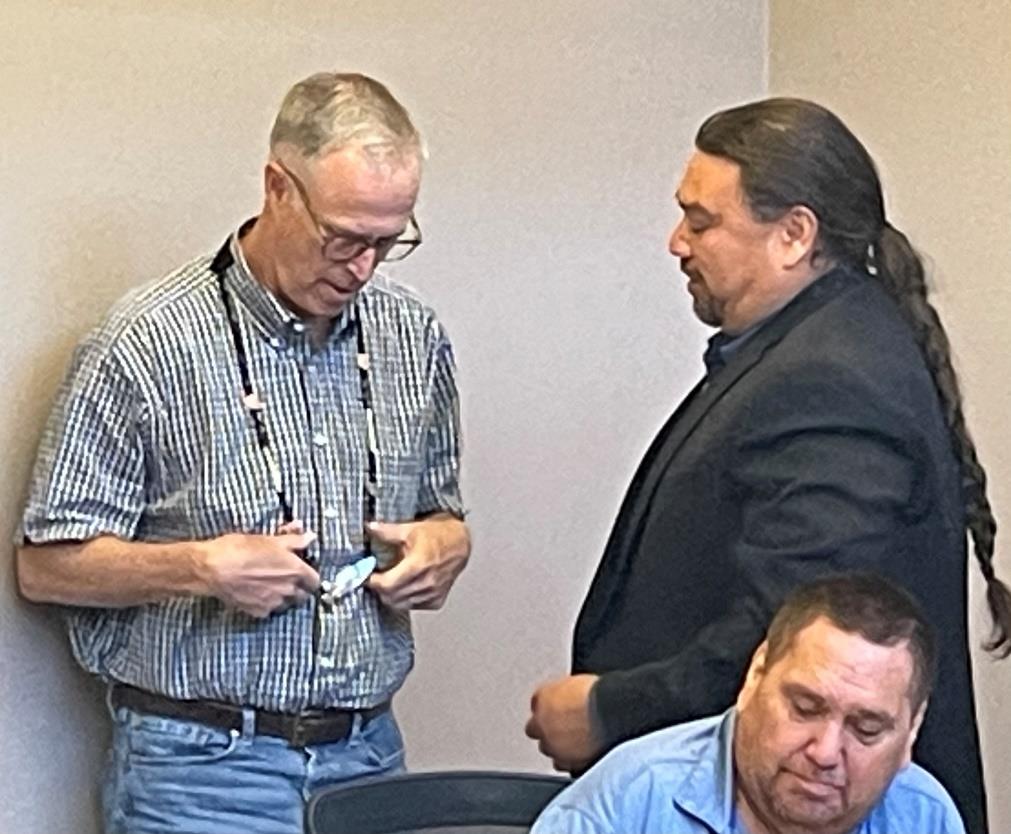Congressman Huffman Meets With Karuk Tribe Leaders to Discuss Social, Cultural and Economic Impacts of TEK
Congressman Jared Huffman visited the Karuk Tribe in Happy Camp to discuss the impacts of Traditional Ecological Knowledge (TEK), housing, and wildfire resilience while touring cultural burn sites, housing projects, and the Tribe’s Tishaniik Farm.
Congressman Huffman Meets With Karuk Tribe Leaders to Discuss Social, Cultural and Economic Impacts of TEK
Congressman Jared Huffman visited the Karuk Tribe in Happy Camp to discuss the impacts of Traditional Ecological Knowledge (TEK), housing, and wildfire resilience while touring cultural burn sites, housing projects, and the Tribe’s Tishaniik Farm.

Happy Camp, CA [06-20-24]: Congressman Jared Huffman’s most recent trip to Happy Camp proves his commitment to District 2 as this remote region is rarely visited by public officials.
The visit began with Congressman Huffman meeting with the Karuk Tribe Council where they presented the Congressman with a traditional necklace as an appreciation gift for his dedication to the Karuk Tribe and his work towards the Katimiîn and Ameekyáaraam Sacred Lands Act that became a law back in January of 2023.
“It is always very much appreciated when the Congressman and his staff come to learn about issues important to us. There is no substitute to getting out on the land and seeing the outcomes of our cultural burning efforts, learning the histories of our people, and discussing the policies that help and hinder the ability to fulfill our indigenous responsibilities,”
said Bill Tripp, Director of Natural Resources and Environmental Policy, who took the Congressman and his two staff members, John Driscoll and Andrew Cairns, on a tour through the heart of the Karuk Aboriginal Territory along with Sara Spence, the Executive Director of the Karuk Tribe Housing Authority.
Their first stop was Somes Bar to see a cultural burn site where they discussed Karuk Traditional Ecological Knowledge (TEK) and the Social, Cultural and Economic Impacts that have resulted from decades of being denied access to utilize Traditional Forest Management practices. You can read more about these impacts here.
The second stop was the Orleans Karuk Tribe Housing Authority (KTHA) Community where they toured a vacant unit showcasing how well the units are maintained even as they are approaching 30 years of age. “The rental units in Orleans were constructed in 1997 and were the third project built by KTHA, which was established in 1984, making this year its’ 40th Anniversary!” Sara Spence highlighted. She also showed Congressman Huffman the eight (8) low-income rental units that will be breaking ground soon, as well as the future home of the Orleans Wellness Center. “This center will be constructed where the Orleans Mining Company used to be, in the coming years,” she said.
“We also discussed the direct impact that Forest Management Practices has on rural communities where there is a high risk of wildfire, and how the lack of availability and unrealistic cost for homeowners’ insurance, resulting from mismanagement of the forest, is crippling Karuk Tribal Members’ ability to attain their goals of homeownership and security for their families,” said Sara Spence.
Bill Tripp further states, “we called out concerns regarding flawed funding formulas, restrictive program policies, and missing authorities that could improve our situation. We called special attention to additional workforce housing needs, potential land transfers, and regenerative economic systems, as well as Tribal-oriented discussions that informed development of ON FIRE: The Report of the Wildland Fire Mitigation and Management Commission which highlights many of these important topics and more.”
Their last stop on the tour was at the Karuk Tribe’s Tishaniik Farm, which is part of their Food Sovereignty program, to view another site where TEK is being utilized to manage the landscape, and protect the Karuk Tribe’s cultural resources. The next cultural burn will occur at Tishaniik Farm this weekend June 22nd through June 29th during the 2nd Annual Karuk Women’s Trex.
“Protecting the Karuk Tribe’s cultural resources, help us to regain a sense of purpose, and revitalize our indigenous knowledge, practice and belief systems,” Bill Tripp said when reflecting on this meeting.

